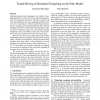Free Online Productivity Tools
i2Speak
i2Symbol
i2OCR
iTex2Img
iWeb2Print
iWeb2Shot
i2Type
iPdf2Split
iPdf2Merge
i2Bopomofo
i2Arabic
i2Style
i2Image
i2PDF
iLatex2Rtf
Sci2ools
121
click to vote
SODA
2004
ACM
2004
ACM
Torpid mixing of simulated tempering on the Potts model
Simulated tempering and swapping are two families of sampling algorithms in which a parameter representing temperature varies during the simulation. The hope is that this will overcome bottlenecks that cause sampling algorithms to be slow at low temperatures. Madras and Zheng demonstrate that the swapping and tempering algorithms allow efficient sampling from the low-temperature mean-field Ising model, a model of magnetism, and a class of symmetric bimodal distributions [10]. Local Markov chains fail on these distributions due to the existence of bad cuts in the state space. Bad cuts also arise in the
Algorithm | Algorithms | Ising Model | Potts Model | SODA 2004 |
Related Content
| Added | 31 Oct 2010 |
| Updated | 31 Oct 2010 |
| Type | Conference |
| Year | 2004 |
| Where | SODA |
| Authors | Nayantara Bhatnagar, Dana Randall |
Comments (0)

